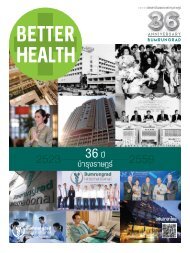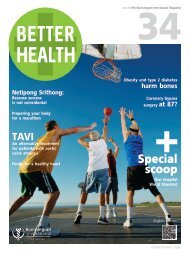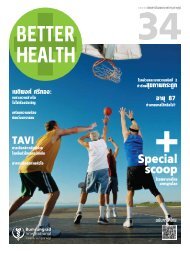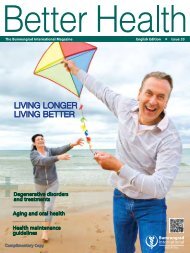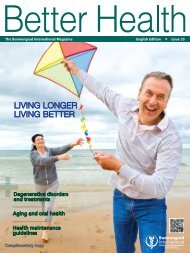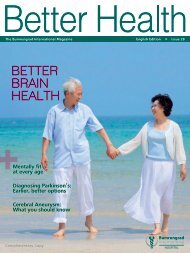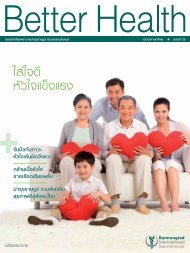Better Health 25 Eng
The magazine for patients and friends of Bumrungrad International Hospital, Thailand.
The magazine for patients and friends of Bumrungrad International Hospital, Thailand.
- TAGS
- bumrungrad
- hospital
- thailand
Create successful ePaper yourself
Turn your PDF publications into a flip-book with our unique Google optimized e-Paper software.
HEALTHY AGING<br />
Aging without disease<br />
<strong>Health</strong>ier senior years depend on preventing <br />
age-associated diseases.<br />
The world keeps getting older. Demographics and <br />
longevity gains have expanded the size of the <br />
senior population in most parts of the world,<br />
including Thailand. Thailand’s senior population, those<br />
aged 60 or older, has surpassed 8 million – about 11<br />
percent of the total population – an increase of almost<br />
one million since 1997. <br />
The population has been “graying” in large part<br />
because people are living longer; a study by the Institute<br />
for Population and Social Research at Thailand’s Mahidol<br />
University reported the average life expectancy<br />
for Thai children born in 2010 is 73 years – 13 years<br />
longer compared to children born in 1975. And it’s<br />
expected to increase further to nearly 80 years<br />
within another decade. <br />
The gift of long life is more precious when<br />
those extra years are lived in good health. But<br />
many still spend their golden years confronting<br />
one health problem after another. For expert<br />
insight on healthier aging,<br />
turned to<br />
Dr. Lily Chaisompong, a Bumrungrad specialist <br />
in geriatric health with many years of experience<br />
helping patients enjoy healthier, higher quality<br />
senior years. <br />
<br />
Beyond the numbers<br />
In chronological terms, 60 is the commonly<br />
accepted age when an adult becomes a senior.<br />
But from a medical perspective, chronological age<br />
doesn’t tell the full story of an individual’s overall<br />
health or level of physical fitness. “Each person<br />
ages at his or her own pace, so chronological age<br />
alone doesn’t reveal a lot,” says Dr. Lily. “The body<br />
begins its decline around the age of 40. While many<br />
factors affect the aging process, it’s clear that taking<br />
better care of one’s health slows the rate of decline.” <br />
Some of the most serious health problems pose greater<br />
threats as we age. These health problems related to age<br />
fall into one of two categories. Age-associated conditions,<br />
such as cardiovascular disease, increase in frequency<br />
with age. The other category, age-specific diseases,<br />
includes conditions such as osteoporosis and Alzheimer's<br />
disease that affect only older age groups. (A related<br />
article can be found on page 15). <br />
Vascular threats<br />
Vascular-related disorders such as diabetes, high <br />
blood pressure and stroke are not directly associated<br />
with aging. They typically affect people whose prolonged,<br />
unhealthy habits – especially poor diets and lack of<br />
exercise – lead to high blood sugar and high cholesterol,<br />
key risk factors for vascular diseases. Reducing these



